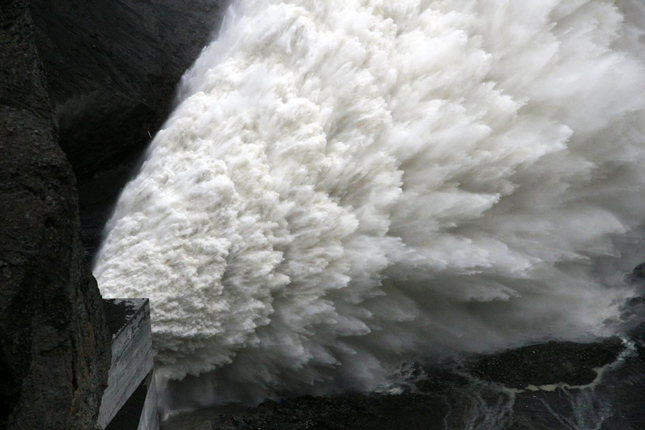-
Hydro-Diplomacy Can Build Peace Over Shared Waters, But Needs More Support

From Ukraine and the Middle East to sub-Saharan Africa and East Asia, the world is engulfed in a series of significant international crises. But despite such urgent issues, it would be a grave mistake to forget about the structural foreign policy challenges – such as access to water – that could become the crises of the future.
It would be a grave mistake to forget about the structural foreign policy challenges that could become the crises of the future
According to a new report from adelphi, launched at World Water Week in Stockholm, foreign policy-makers need to exert more political leadership in transboundary basins to safeguard regional stability and harness the opportunities for cooperation around shared waters.
The Rise of Hydro-Diplomacy argues that policymakers can reap peace dividends by investing in intrabasin cooperation, which can help resolve existing conflicts, prevent future conflicts, and create goodwill that spills-over beyond water.
Heading Off Conflict
In Pakistan, 90 percent of the country’s food and 65 percent of its employment depend on agriculture in the Indus Basin. Despite a successful treaty on water-sharing with India, which the Indus passes through before entering Pakistan, tension over withdrawals and new infrastructure projects is ongoing.
Economic development and demographic changes, particularly population growth, are increasing demand while climate change is projected to disrupt supplies in variable ways. A Wilson Center study found an estimated 30,000 residents of Karachi already die each year from poor quality drinking water, due in part to the amount diverted upstream.
Given the stakes, the consequences of major changes in the basin could be dire. Yet water does not have to be a flashpoint for conflict; instead, given how fundamental it is to all societies, it can build bridges to peace.
The 1960 Indus Waters Treaty has survived three wars between India and Pakistan and prevented water from becoming a weapon during those conflicts. And the Itaipu Dam, the world’s largest hydroelectric facility, helped resolve a territorial dispute between Brazil and Paraguay. These and other examples demonstrate the potential of “hydro-diplomacy” to prevent conflict and generate benefits for all sides.
Political Leadership and Coordination
The Rise of Hydro-Diplomacy identifies three main challenges to more success stories like these: the lack of political leadership for hydro-diplomacy at the international level; the lack of strategic coordination between actors; and limits on the human, institutional, and financial capacity necessary for better transboundary water cooperation.
Stronger political leadership is necessary to realize potential synergies between political and technical engagement. Dams or improved irrigation can frequently provide technological solutions to water scarcity and variability, but may also entail negative environmental and social consequences as well as raise fears about water availability and control downstream.
Stronger political leadership is necessary to realize potential synergies between political and technical engagement
To resolve these transboundary political problems, we need foreign policy initiatives that underpin solutions with a political mandate, leverage, and diplomatic intuition. The international community has to establish institutional settings that better connect those seeking to foster enhanced cooperation in shared basins, and additional diplomatic engagement is necessary to lend political weight to these institutions, especially when it comes to working with basin hegemons that are reticent to work multilaterally.
Second, better coordination is needed both within and between governments to ensure that no basin is left behind. Initiatives in basins where donor interests cluster are sometimes derailed by “forum shopping,” where each party has its own favorite international negotiation forum that is prioritized above others. This leads to protracted tactical games between parties, not improved cooperation.
Yet better coordination is also a national challenge. The synergies between the “low politics” of technical and financial cooperation and the “high politics” of foreign policy could be far greater if they were designed to be mutually enabling. In the case of the Nile, for example, technical solutions that encourage more sustainable water use could help resolve the current impasse over water allocation by increasing water availability. Technical solutions alone rarely solve political problems – otherwise the Nile dispute would have been solved long ago. What is also necessary is politically astute diplomacy that can overcome the bureaucratic inertia and political risk aversion which results in fixation on short-sighted and mutually exclusive “national interests.”
Proactive Investment Needed
Third, a number of capacity-related problems hamper cooperation on transboundary waters. Individual donors can take concrete steps to address these issues by investing in training, expanding efforts to build trust, and improving water-related crisis response and conflict resolution mechanisms.
Nothing could be more worthy of the additional political and financial capital
In short, the international community needs to strengthen the diplomatic track of transboundary cooperation. This is a shared task for the technical, development, and foreign policy communities – and a task that both forms the basis for political engagement and depends on strong and coordinated international efforts.
Investing in water diplomacy at a time of so many other demanding crises may appear to be an optional luxury. Yet, as has been said so many times before, there is nothing more fundamental to human life than freshwater, and given the impending threats to its availability, nothing could be more worthy of the additional political and financial capital that hydro-diplomacy requires.
Download the full report, ‘The Rise of Hydro-Diplomacy,’ from adelphi.
Benjamin Pohl is a senior project manager with adelphi, advising on climate and resource governance and their intersection with foreign, security, and development policy. Susanne Schmeier is the coordinator for transboundary water management at GIZ, the German agency for development cooperation.
Sources: Adelphi, Wilson Center.
Photo Credit: Bottom outlet testing, courtesy of flickr user Tom Olliver.
Topics: adaptation, Africa, agriculture, Asia, Brazil, climate change, conflict, cooperation, Egypt, energy, environment, environmental peacemaking, environmental security, featured, food security, foreign policy, Guest Contributor, India, international environmental governance, natural resources, Pakistan, Paraguay, population, sanitation, security, water
 A Publication of the Stimson Center.
A Publication of the Stimson Center.



